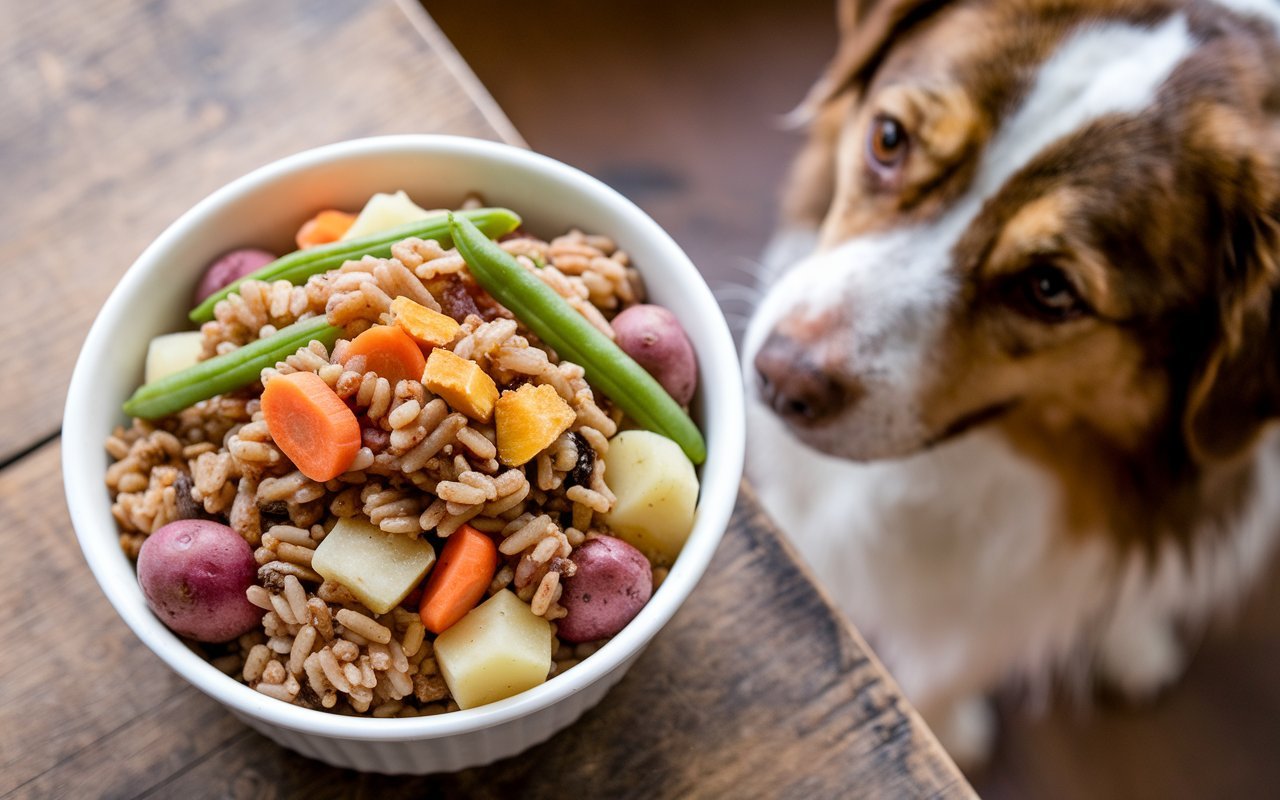The Rise of Plant-Based Dog Food: Is It Right for Your Dog?
Plant-based dog food has gained popularity among pet owners looking for healthier, eco-friendly nutrition options for their furry friends. These diets primarily consist of fruits, vegetables, grains, and legumes, which can provide all the necessary nutrients without meat.
Growing Trend Towards Plant-Based Diets for Dogs
Various factors drive the shift towards plant-based diets for dogs:
- Health Consciousness: Owners are increasingly aware of the health benefits plant-based foods can offer.
- Sustainability: Many choose to reduce their pets' carbon paw print by opting for plant-based alternatives.
- Ethical Reasons: Pet owners passionate about animal welfare are drawn to meat-free options.
This growing trend reflects a broader movement towards healthier, more sustainable lifestyles for both pets and their humans.
Nutritional Considerations
Essential Nutrients for Dogs
When transitioning to a plant-based diet, it's crucial to ensure that dogs receive all their essential nutrients, including:
- Proteins: Necessary for muscle growth and repair.
- Fats: Essential for energy and skin health.
- Carbohydrates: Provide energy and aid digestion.
- Vitamins and Minerals: Support overall health.
Plant-Based Sources of Key Nutrients
Fortunately, numerous plant-based foods can provide these vital nutrients:
- Proteins: Lentils, chickpeas, and quinoa.
- Healthy Fats: Flaxseed and chia seeds.
- Carbohydrates: Sweet potatoes and brown rice.
By carefully selecting these ingredients, pet owners can create a balanced diet that meets all of their dog's nutritional needs.

Benefits and Potential Concerns
Health Benefits of Plant-Based Diets for Dogs
Transitioning to a plant-based diet can offer numerous health benefits for dogs:
- Improved Digestion: High fiber content aids gastrointestinal health.
- Allergy Management: A limited-ingredient diet can help manage food sensitivities.
- Weight Management: Plant-based foods can be lower in calories, promoting healthy weight.
Many pet owners report increased energy levels and shiny coats after making the switch.
Addressing Concerns about Plant-Based Dog Food
Despite these benefits, some owners may worry about providing adequate nutrition. Common concerns include:
- Deficiencies: Lack of essential amino acids, vitamins, or minerals.
- Palatability: Some dogs may resist new flavors or textures.
It’s crucial to balance these diets and consult with a vet to address potential nutrient gaps effectively.
Transitioning Your Dog to a Plant-Based Diet
Gradual Transitioning Process
Successfully transitioning your dog to a plant-based diet requires a gradual approach. This helps avoid digestive upset and allows your dog to adjust to new flavors. Start by mixing small amounts of plant-based food with their regular diet:
- Week 1: 25% plant-based and 75% regular food.
- Week 2: 50% plant-based and 50% regular food.
- Week 3: 75% plant-based and 25% regular food.
- Week 4: 100% plant-based diet.
Monitoring Your Dog's Health During the Transition
As you transition, keep a close eye on your dog's health and behavior. Look for any signs of discomfort or allergies and assess:
- Energy Levels: Are they more active or lethargic?
- Coat Condition: Is their fur shiny and healthy?
- Digestive Health: Monitor stool consistency and frequency.
Keeping a journal can be helpful in tracking these changes, ensuring your furry friend adjusts smoothly to their new diet.
Popular Plant-Based Dog Food Brands
Review of Leading Plant-Based Dog Food Options
As plant-based diets for dogs gain traction, several brands are leading the charge. Here are some top contenders:
- V-Dog: Offers kibble and recipes rich in protein and omega fatty acids.
- Wild Earth: Known for using sustainable ingredients and has a variety of snacks.
- Halo: Focuses on holistic nutrition with clear ingredient sourcing.
Each brand caters to different dietary needs, making them appealing to various pet owners.
Nutritional Profiles and Customer Reviews
Examining nutritional profiles and customer feedback is essential for making informed choices:
- V-Dog: High in protein, many customers report improved digestive health.
- Wild Earth: Praised for its palatability, dogs enjoy the taste and texture.
- Halo: Owners appreciate the quality ingredients and noticeable health benefits.
Checking reviews can guide you in selecting the best option for your dog's unique needs.

Consulting with a Veterinarian
Importance of Professional Guidance
Before making significant dietary changes, it is essential to consult with a veterinarian. A well-informed vet can provide insights into your dog's specific nutritional needs and help prevent potential deficiencies that a plant-based diet might cause. They can also guide you in creating a balanced meal plan tailored to your dog’s health requirements.
Tips for Finding a Vet Supportive of Plant-Based Diets
Finding a veterinarian who supports plant-based diets can be challenging. Here are some tips:
- Research: Look for vets who specialize in holistic or integrative medicine.
- Ask Questions: During your initial visit, inquire about their views on plant-based options.
- Read Reviews: Check online reviews or forums to see what other pet owners say.
Creating a collaborative relationship with your vet ensures your dog thrives on a plant-based diet.
Personalized Diet Plan for Your Dog
Factors to Consider in Customizing a Plant-Based Diet
Creating a personalized plant-based diet plan for your dog involves several key factors:
- Age and Size: Puppies and large breeds may require different nutrient levels.
- Activity Level: More active dogs may need additional calories and protein.
- Health Conditions: Specific health issues may necessitate tailored nutritional adjustments.
Taking these factors into account will help ensure your dog receives a balanced diet.
Sample Meal Plan and Feeding Guide
Here’s a simple sample meal plan to consider:
- Breakfast: 1 cup of quinoa mixed with steamed carrots and peas.
- Lunch: 1 cup of lentils blended with sweet potatoes and spinach.
- Dinner: 1 cup of brown rice paired with chickpeas and diced bell peppers.
Adjust portion sizes based on your dog’s weight and activity level, and always consult your vet for personalized adjustments. This will ensure that your pup enjoys a nutritious, balanced diet tailored to its specific needs.
Conclusion
Recap of Plant-Based Dog Food Pros and Cons
As we wrap up our exploration of plant-based dog food, it's essential to weigh the pros and cons.
Pros:
- Health benefits including improved digestion and weight management.
- Ethical and environmental advantages.
Cons:
- Nutritional gaps if not carefully planned.
- Potential resistance from picky eaters.
Balanced nutrition is crucial for your dog’s well-being.
Final Considerations for Your Dog's Diet
In conclusion, transitioning your dog to a plant-based diet can be a wonderful choice, provided it’s done thoughtfully. Regular vet consultations and careful ingredient selection are vital for success.
Remember to observe your dog's response, adjust as needed, and enjoy the journey of nourishing your pet with love and care. Your dog’s health and happiness will be the ultimate reward!



.jpg)



